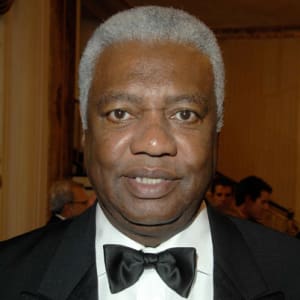
Oscar Robertson
Hall of Fame basketball guard Oscar Robertson established numerous records over his 14-year NBA career with the Cincinnati Royals and Milwaukee Bucks, retiring as the league’s all-time leader in assists.
Synopsis
Oscar Robertson was born in 1938 in Tennessee and raised in Indiana. After leading the all-African-American Crispus Attucks High School basketball team to historic state titles in 1955 and '56, he became a star at the University of Cincinnati. Upon joining the NBA's Cincinnati Royals in 1960, Robertson redefined the point guard position with his all-around skills, becoming the first player to average a "triple-double" over a full season. Additionally, he helped pave the way for free agency as president of the players' union. After wrapping up his 14-year career as the NBA's all-time assist leader, Robertson was inducted into the Basketball Hall of Fame in 1980.
Early Years and Schools
Oscar Palmer Robertson was born on November 24, 1938, in Charlotte, Tennessee, and moved with his family to Indianapolis, Indiana, at age 4. With his parents struggling to earn a living, Robertson learned to play basketball by shooting tennis balls and rags held together with rubber bands, eventually developing his game on a dirt court with his brothers, Henry and Bailey.
Blossoming into a tall, talented player, Robertson joined the varsity team at Crispus Attucks High School. As a junior in 1955, he led Crispus Attucks to the Indiana state title, the first time an all-African-American team had accomplished the feat. He and his teammates won a second crown the following season, culminating a remarkable two-year stretch in which they went 62-1. Robertson was named Indiana's Mr. Basketball that year.
Nationally recruited, Robertson became one of the first black players at the University of Cincinnati. He led the nation in scoring in each of his three years with the varsity team, recording an average of 33.8 points per game, and was named Player of the Year in all three seasons. Additionally, he twice led Cincinnati to a berth in the Final Four of the NCAA Tournament. While a national championship eluded the star guard, Robertson co-captained the 1960 Olympic team, teaming up with future NBA rival Jerry West to lead the men’s squad to a gold medal.
Pro Basketball Stardom
That same year, the Cincinnati Royals selected Robertson in the NBA draft. For the 6'5" guard, little adjustment was needed to make his presence felt at the professional level. He was named MVP of the All-Star Game, and voted Rookie of the Year after averaging 30.5 points per game and a league-high 9.7 assists per game.
The following year, Robertson turned in one of the all-time great individual seasons when he became the first player in league history to average a "triple-double": double digits in points (30.8), rebounds (12.5) and assists (11.4). No player since has matched the accomplishment.
With his quick moves and ability to score, dribble, pass and rebound from the point guard position, Robertson displayed a skill set that was years ahead of its time. He was named MVP in 1964 after averaging a career-high 31.4 points per game, and wound up leading the NBA in assists seven times over the course of the decade. During the 1967-68 season, he achieved the rare feat of topping the league in both points and assists per game.
Off the court, Robertson proved a valuable member of the players’ union, eventually heading up the organization for several years. Under his direction, the union in 1970 filed a lawsuit that challenged a proposed merger between the NBA and rival ABA, as well as rules pertaining to the college draft and ownership rights to players. The legal challenge eventually was settled in 1976, with the "Oscar Robertson Rule" bringing free agency to NBA players.
Meanwhile, a championship remained out of reach for Robertson during his time in Cincinnati, and his relationship with the team deteriorated. Finally, on April 21, 1970, Robertson was dealt to the Milwaukee Bucks, an up-and-coming club anchored by its young center, Lew Alcindor (later known as Kareem Abdul-Jabbar).
For the Bucks, Robertson proved to be the final piece needed for the building of a championship season. In the spring of 1971, Milwaukee finished off a magical year by sweeping the Washington Bullets in the NBA Finals. Robertson was finally a champion.
In all, Robertson played three more seasons for the Bucks, finally hanging up his jersey for good in 1974 after a disappointing seven-game loss to the Boston Celtics in the NBA Finals. Retiring with a career average of 25.7 points per game, the "Big O" had also collected more rebounds than any guard in NBA history and set a record with 181 triple-doubles. His 9,887 career assists was another record that stood until it was surpassed by Magic Johnson in 1991.
Post-Retirement and Legacy
With his unmatched all-around play, Robertson established the gold standard for versatility and paved the way for future plus-sized ball handlers like Magic Johnson and LeBron James. He was inducted into the Basketball Hall of Fame in 1980, and was named one of the NBA's 50 Greatest Players in 1996. Four years later, he was voted the Player of the Century by the National Association of Basketball Coaches.
Author of The Big O: My Life, My Times, My Game, Robertson remained active in business and served as a spokesman for the National Kidney Foundation in his later years. His fighting spirit still intact, he joined a class-action antitrust lawsuit in 2011 over the unauthorized use of his image from his days as a college basketball player.




